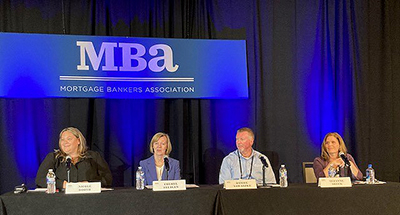
#MBARMQA22: Risk Management Executive Perspectives

((l-r) Nicole Booth; Cheryl Feltgen; Dan Sawatzke; Suzanne Shuck.)
NASHVILLE, TENN.—The mortgage industry has shifted quickly from record originations in 2021 to sharp declines in volume and rising interest rates this year.
What does it mean for risk management professionals? Mortgage executives here at the MBA Risk Management, QA and Fraud Prevention Forum offered insights on leading their organizations through today’s lending environment, maintaining quality operations, managing credit risk and governing organizations in unpredictable times.
“We’ve seen how interest rates have impacted everyone, especially on the origination side,” said Suzanne M. Shuck, Executive Vice President and Chief Risk Officer with Freedom Mortgage Corp., Mr. Laurel, N.J. “We’re seeing a lot of movement in the industry right now, with some lenders exiting the market or reducing their operations.”
Additionally, Shuck said, Fannie Mae and Freddie Mac have come out with new rules. “There’s a lot of activity that is keeping us hopping.”
“Sales team are moving to prepare for that next increase in business; however, in the short term, companies are creating new products and servicers,” said Dan Sawatzke, Senior Vice President and Chief Compliance and Risk Officer with Academy Mortgage Corp., Draper, Utah. “That’s to attract loan officers. We’re seeing loan officers being offered huge bonuses to move to another organization; you do that by offering new products.”
“Overvaluation is something we’re focused on,” said Cheryl Feltgen, Executive Vice President and Chief Risk Officer with Arch Mortgage Insurance Co., Greensboro, N.C. “There is also inflation, so we’re seeing whether or not the Fed can craft a soft landing.”
The effects of inflation, Sawatzke said, depends on the operation. If you want to buy a house, you’re dealing with inflation,” he said.
“And with inflation, house prices increase,” Shuck said. “I’m less worried about inflation than I am a recession. We’re also seeing an increase in ARMs, but we’re not worried about that. The credit profiles for ARM borrowers are much higher and the quality of the loan products are better. And the qualifying criteria are much more stringent. We’re expecting the performance of ARMs to be similar to more conventional products.”
“If rates are going to go up, you’re probably going to want a fixed-rate product,” Sawatszke said. “If they’re going down, you might want to take a chance on an ARM.”
Feltgen said climate change is having an impact on the housing market—although not as dramatically as it could. “Climate change is definitely real,” she said. “In the long term, there will be an impact on value, and it will depend on how quickly events change and how quickly consumers notice and adapt. If investors start changing their view when they buy mortgage-backed securities; if the GSEs change their criteria; then we could see some real change.”
Feltgen also expressed concerns about expanding the credit box too soon; and failure to test products before launching them. “We all remember what happened with stated income loans,” she said. “We have to move with caution; we have to look at sustainability, not only for the customer but also for the lender. If something grows too fast, it’s probably a weed.”
“Everyone has a role in risk management,” Feltgen added. “Revenue is not as important as having sound practices in place.”
